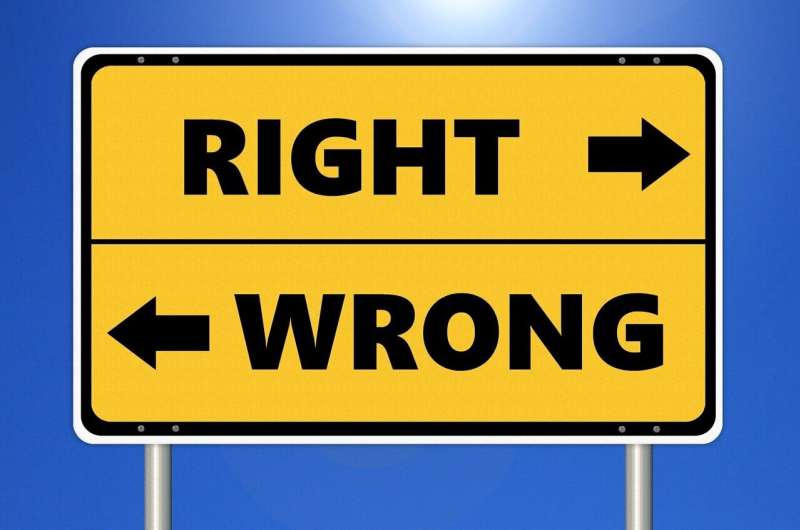A group's moral values may help determine the likelihood of hate-motivated harmful acts

From attacks on synagogues and mosques to the COVID-era spike in anti-Asian sentiment, the past couple of years, unfortunately, have seen no shortage of acts of hatred.
But because of the statistical rarity of hate crimes, developing computational models to predict where they might occur has been a scientific challenge.
But a study led by scientists at the USC Dornsife College of Letters, Arts and Sciences does just that.
Published July 28 in the scientific journal Nature Communications, the research suggests that, within a given county, the moral values oriented around group preservation can help determine the prevalence of hate groups and so-called "extreme behavioral expressions of prejudice" (EBEPs)—that is, harmful acts motivated by hate or bigotry.
"The most striking aspect of our study is our use of geospatial modeling, which showed that the prevalence of hate groups at the county level can be predicted based on the psychological makeup of that county—specifically, the moral concerns," said corresponding author Morteza Dehghani, associate professor of psychology and computer science, and a researcher at USC Dornsife's Brain and Creativity Institute.
The study suggests that the prevalence of specific moral concerns is predictive of the number of hate groups per capita in that county, added Dehghani, five of whose students—from USC Dornsife's Department of Psychology and the Department of Computer Science at USC Viterbi School of Engineering—also worked on the research.
"Our work is built on prior work linking violence and morality. In this research, we advance the understanding of extreme behavioral expressions of prejudice by proposing the Moralized Threat Hypothesis, which suggests that acts of hate are often motivated by the belief that somebody outside your own group has done something morally wrong and they should be excluded or punished for that wrong-doing" said Mohammad Atari, Ph.D. candidate in social psychology at USC's Department of Psychology.
Extreme forms of morality and their societal consequences
Dehghani has been studying hate crimes since 2016, such as probing how moral rhetoric on Twitter may signal whether a protest will turn violent.
"I've always been interested in extreme forms of morality and their consequences," he said. "Most forms of genocide or killings are explained through morality—'it was for the greater good. Someone has done something morally wrong, therefore it's OK to do what we did to them.'"
Dehghani's latest paper on EBEPs, he said, is the first to use geospatial modeling paired with behavioral experimentation to predict acts of violence against marginalized groups.
In the study, Dehghani and his student colleagues focused on extreme behavioral expressions of prejudice that were aligned with far right-wing ideologies. People who endorse the ideological right tend to strongly care about so-called "binding" values, such as loyalty to peers and respect for leaders, as much as moral concerns focused on individuals' rights and well-being, he explained. People who are more left leaning, however, tend to only prioritize the latter set of values.
A key finding in the paper was the relationship between the county-level rate of hate groups and county-level endorsement of binding values. Since the study finds a strong association between the two, local governments could perhaps take steps to target resources to dampen any potential acts of hate, Dehghani said.
"Also," he added, "we have an immigration crisis. Where are the best locations to place the immigrants? We could look at counties where binding values are not highly prioritized."
Two actual groups, two fictional groups part of study
In addition to the geospatial analysis of more than 3,100 U.S. counties, the researchers collected data from U.S. adults via surveys and asked questions about anti-Mexican and anti-Muslim acts of hate. The researchers also asked questions about fictional groups to probe the relationship between people's moral values and the degree to which they justify extreme behavioral expressions of prejudice even when such group does not exist in the real world.
They focused on four distinct EBEPs in their social psychological experiments: posting hate speech on Facebook, sharing hate speech on flyers, verbally assaulting a member of a marginalized group, and physically assaulting a member of a marginalized group.
Results of the social psychological experiments on more than 2,200 participants showed a strong link between their binding values and the degree to which they perceived EBEPs against certain groups, such as Muslims, to be justified.
"Our findings are consistent with the hypothesis that acts of hate are morally motivated behaviors," Dehghani said. "And research suggests that, at least in the United States, binding values are held more strongly among people who report right-wing political ideology."
More information: Joe Hoover et al, Investigating the role of group-based morality in extreme behavioral expressions of prejudice, Nature Communications (2021). DOI: 10.1038/s41467-021-24786-2
Journal information: Nature Communications
Provided by University of Southern California





















